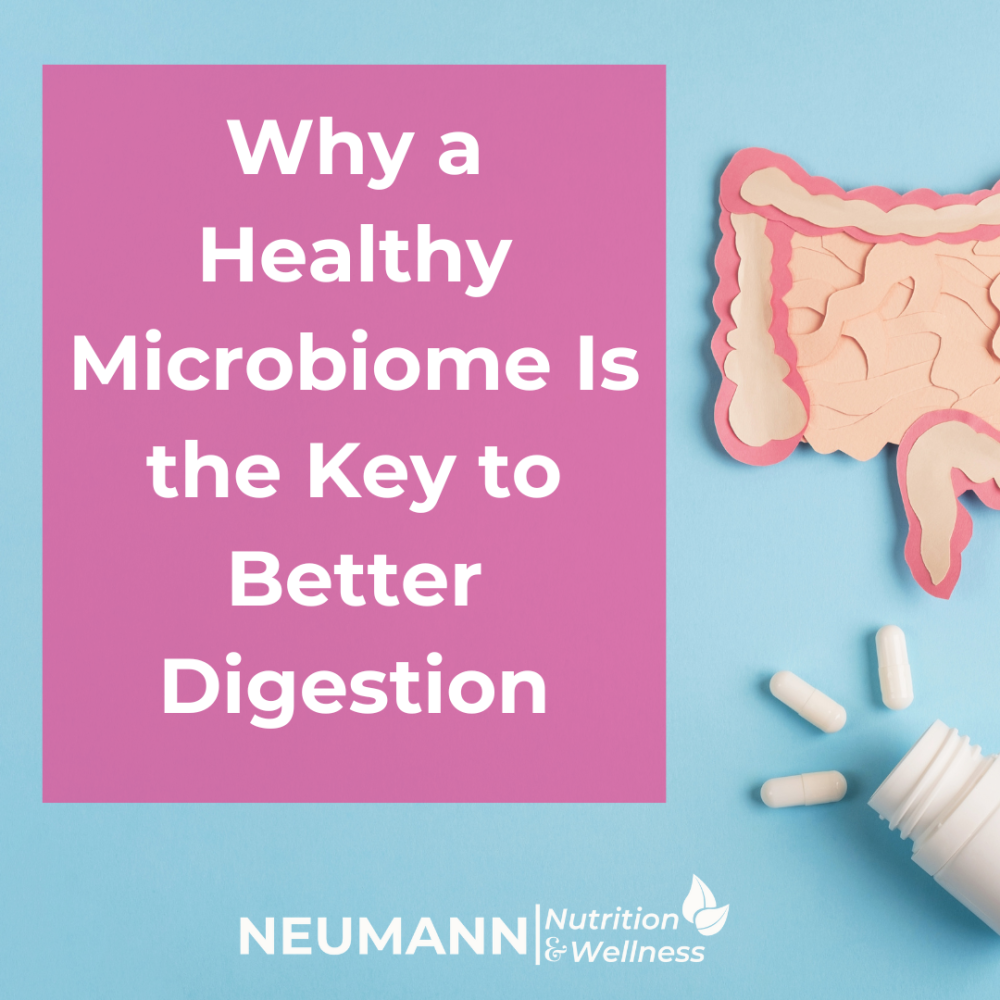
Tiny but Mighty: Why Your Microbiome Runs the Show
What if I told you that the real key to feeling like a million bucks isn’t just about kale smoothies or sweating it out at the gym? The key player in your overall health is something you can’t even see—your gut microbiome.
Trillions (yep, with a T) of tiny microbes—bacteria, fungi, arkea, and viruses—are throwing the wildest party inside your digestive system, and they’re calling the shots on everything from your mood to your metabolism.
You’re not just you—you’re basically a walking, talking microbe metropolis. The bacteria in your gut outnumber your own body’s cells, which means you’re a living ecosystem of microorganisms. Wild, huh?
These little gut bugs? They’re not just hanging out for fun. They’re working overtime—breaking down your food, running quality control on your immune system, and even shooting messages to your brain (yes, the gut-brain axis is a real thing).
When your gut’s in balance, you’re firing on all cylinders—you’re energized, clear-headed, and you’re digestion is running smoothly.
But when things get imbalanced? Digestive drama, chronic health struggles, and feeling like you’re just going through the motions without any real vitality are the norm.
As you can see, your gut microbiome goes far beyond digestion. It’s a central player in immune function, metabolism, brain health, and more. Prioritizing it is essential for long-term wellness.
Digestive Diseases Linked to a Microbiome Imbalance
When your gut microbiome is out of balance, it can spark a cascade of digestive issues. Let’s break down a few of the most common ones:
1. Irritable Bowel Syndrome (IBS)
IBS isn’t just a little stomach trouble—it’s one of the most common (and most frustrating) digestive disorders out there, hitting millions of people worldwide with symptoms like bloating, cramping, constipation, and diarrhea.
Science backs up what your stomach’s been trying to tell you—IBS is often linked to dysbiosis, a disrupted gut microbiome. When the wrong bacteria take over, it can interfere with gut motility, trigger inflammation, and send your immune system into overdrive. All of this can lead to frustrating symptoms of IBS
2. Inflammatory Bowel Disease (IBD)
Crohn’s Disease and Ulcerative Colitis (UC) fall under the umbrella of Inflammatory Bowel Disease, or IBD—conditions marked by ongoing inflammation in the digestive tract. And your gut microbiome can play a significant role.
Studies show that people with IBD often have an imbalanced microbiome, with higher levels of potentially harmful bacteria like Proteobacteria and lower levels of beneficial ones such as Bifidobacterium and Faecalibacterium. This shift can contribute to inflammation and worsen symptoms over time.
When the microbial balance is off, your gut becomes more reactive, and inflammation tends to stick around—making it much harder for the digestive system to function as it should.
3. Celiac Disease
Celiac disease isn’t just a gluten sensitivity—it’s a full-blown autoimmune reaction that kicks in when people with a genetic predisposition eat gluten.
What’s intriguing is that your gut microbiome might play a role in this process. Studies suggest that an imbalance in the microbiome early in life could weaken the gut barrier, making it easier for gluten to trigger the immune system. The result? Inflammation, digestive distress, and a one-way ticket to avoiding bread forever.
4. Leaky Gut Syndrome
While the term “leaky gut” may sound like something out of a sci-fi novel, it’s a real issue that can cause significant health problems. It happens when the protective lining of your gut gets damaged, allowing harmful toxins and undigested food particles to enter your bloodstream.
The condition is often linked to chronic inflammation, as a result of dysbiosis in the microbiome and low levels of microbioal by-products like Indolepropionic Acid. Leaky gut has been implicated in autoimmune diseases, food sensitivities, and even mental health disorders.
5. Small Intestinal Bacterial Overgrowth (SIBO)
SIBO happens when large amounts of bacteria move into the small intestine, when they should be hanging out in the large intestine. When these bacteria invade the wrong area of your intestine, it can lead to bloating, diarrhea, and nutrient deficiencies that leave you feeling drained.
This is a classic case of microbiome imbalance with too many bacteria in the wrong place leads to overgrowth and poor digestion.
6. Upper GI Disorders: GERD, Reflux, and Ulcers
Your microbiome isn’t just calling the shots in your lower gut—it’s got a say in what’s happening up top, too. Issues like Gastroesophageal Reflux Disease (GERD), Acid Reflux, and Peptic Ulcers are signs that your microbiome is off.
When harmful microbes—like Helicobacter pylori—start making a home in your stomach lining, they throw off stomach acid levels leading to heartburn and upper GI discomfort.
But that’s just part of the story. An imbalanced microbiome in your colon can slow digestion, creating pressure in the stomach, triggering acid reflux.
Microbiome imbalances can also mess with gastrin production, the hormone that regulates acid levels in the stomach. The result? You could experience acid reflux and difficulty digesting food, which only exacerbates overall digestive issues.
Other Surprising Effects of Microbiome Imbalance
As discussed earlier, when your gut microbiome is out of whack, it doesn’t just affect your gut. The consequences of dysbiosis can spread throughout your entire body, contributing to a range of serious health conditions. Many people have no idea how deeply the state of their gut affects their mental, physical, and emotional health.
Here are just a few of the conditions linked to an imbalanced microbiome:
1. Autoimmune Diseases
Autoimmune diseases happen when the immune system mistakenly targets the body’s own tissues. The gut microbiome plays a key role in regulating these immune responses. When that balance is disrupted, the immune system can become overactive and start attacking cells it normally wouldn’t
2. Endometriosis
Endometriosis isn’t just “bad period pain”—it’s a chronic condition where tissue similar to the uterine lining starts growing where it doesn’t belong, leading to intense pelvic pain and heavy periods. And while hormones usually take the blame, research is starting to point the finger at another key player: your gut microbiome.
Studies show that women with endometriosis have noticeably different gut bacteria compared to those without it. This imbalanced microbiome can fuel systemic inflammation, making endo symptoms worse.
3. Mental Health Disorders: Anxiety and Depression
Believe it or not, your gut and brain are in nonstop conversation, thanks to something called the gut-brain axis.
Dysbiosis has been linked to anxiety and depression because your gut bacteria are responsible for producing neurotransmitters like serotonin—the “feel good” hormone. When your microbiome is imbalanced, serotonin production takes a hit, leaving you feeling anxious and depressed
A healthy gut isn’t just about digestion—it could be the key to keeping your mood (and mind) in check.
4. High Blood Pressure and Cardiovascular Disease
Think heart health is all about diet and exercise? Your gut has something to say about that. Research shows that an imbalanced microbiome can throw off blood pressure, cholesterol, and inflammation, all of which play a huge role in cardiovascular disease.
When gut bacteria aren’t pulling their weight, they can mess with gut-derived metabolites, making blood vessels stiffer, inflammation worse, and hypertension more likely. On the flip side, a well-balanced microbiome can help keep inflammation in check and support a healthier heart.
5. Obesity and Metabolic Disorders
Think your metabolism is all about calories in, calories out? Not so fast. Your gut microbiome has a huge say in how your body stores fat, processes sugar, and even how hungry you feel. When the wrong bacteria take over, they can slow metabolism, mess with insulin sensitivity, and make weight gain feel inevitable.
One major troublemaker? An overgrowth of bacteria that crank up lipopolysaccharide (LPS) levels, triggering inflammation and insulin resistance—two things you don’t want if you’re trying to keep your metabolism in check. The good news? A balanced microbiome can help regulate weight, improve metabolic function, and reduce your risk of chronic conditions like obesity and type 2 diabetes.
6. Parkinson’s Disease
Parkinson’s gets all the attention for messing with movement—shaky hands, stiff muscles, slow everything. Research shows that people with Parkinson’s have a totally different gut microbiome than those without it, meaning this disease could be brewing in your digestive system long before the first symptom shows up. Turns out, there’s more to the Parkinson’s puzzle than just the brain and gut health may be a missing piece.
How to Keep Your Microbiome in Balance (and Why It Matters)
So, what does all this mean for you? A balanced microbiome isn’t just a luxury—it’s essential for overall health. It’s not just about preventing digestive issues like bloating or constipation; it’s about protecting yourself from a host of chronic diseases and improving your mental well-being.
Here are some actionable steps you can take to support a healthy microbiome:
- Eat a Diverse, Plant-Rich Diet: The more diverse your diet, the more diverse your microbiome. Focus on colorful, fiber-rich foods like fruits, vegetables, legumes, and whole grains. These foods help nourish beneficial bacteria and promote gut diversity.
- Incorporate Probiotics and Prebiotics: Probiotics (good bacteria) and prebiotics (food for good bacteria) can help restore balance in your gut. Look for probiotic-rich foods like yogurt, kefir, kimchi, and sauerkraut. For prebiotics, foods like garlic, onions, and bananas are great choices.
- Manage Stress: Stress can negatively affect your gut health by promoting dysbiosis. Practice stress-reduction techniques like meditation, yoga, or deep breathing.
- Avoid Overuse of Antibiotics: Antibiotics can wipe out beneficial gut bacteria along with harmful ones. Only use antibiotics when necessary and follow your healthcare provider’s advice on recovery.
- Consider Gut-Health Supplements: gut supportive supplements can support a healthy intestinal lining, support gut healing, and boost nutrient absorption. Always choose high-quality, clinically researched supplements to ensure you’re getting the right strains for your needs.
- Test Before You Guess: The best way to determine if you have a microbiome imbalance is to get a Comprehensive Stool Test to evaluate the entire environment of your microbiome. As part of my 3 month Digestive Reset Program, I include cutting edge testing that looks at the WHOLE picture of what’s going on inside your gut.
Conclusion: A Healthy Microbiome = A Healthier You
Your gut microbiome is far more than just a digestive tool. It’s a powerful force that shapes your immune system, your mood, your metabolism, and even your brain. If your gut is out of balance, it could be contributing to a wide range of health issues that affect not only your digestion but your entire body.
So, take care of your microbiome—because when it’s healthy, so are you!
Here’s the Best Part: I’ve Got Your Back in Finding Your Way to True Vitality
No more guessing games, no more randomly eliminating foods and hoping for a miracle.
I’m here to help you design a clear, customized path to wellness that’s built specifically for your body. We’ll pinpoint the exact foods causing your gut issues, then work together to create a plan that heals and restores balance. This isn’t a one-size-fits-all approach—it’s a solution tailored to you.
Ready to uncover the true cause of your inflammation and start your life changing gut healing journey? My program is custom-built and reserved only for those who’re ready to go all in. Schedule a free consult with me to get started on your path to lasting wellness.
References
- Hou, Y., & Liu, M. (2019). “Gut Microbiota and Parkinson’s Disease.” Journal of Parkinson’s Disease, 9(1), 1-10.
- Kling, M., Konig, A., & Roth, S. (2020). “Gut Microbiome Alterations in Endometriosis.” Human Reproduction, 35(4), 890-897.
- Cryan, J. F., & Dinan, T. G. (2012). “Mind-Altering Microorganisms: The Impact of the Gut Microbiota on Brain and Behaviour.” Nature Reviews Neuroscience, 13(10), 701-712.
- Cani, P. D., & Everard, A. (2007). “Gut Microbiota, Endotoxins, and Obesity.” Nature Reviews Endocrinology
- Tack, J., et al. (2012). Neurogastroenterology & Motility.
- Zhang, X., et al. (2016). Gut.
- Rosen, R., et al. (2018). The American Journal of Gastroenterology.

